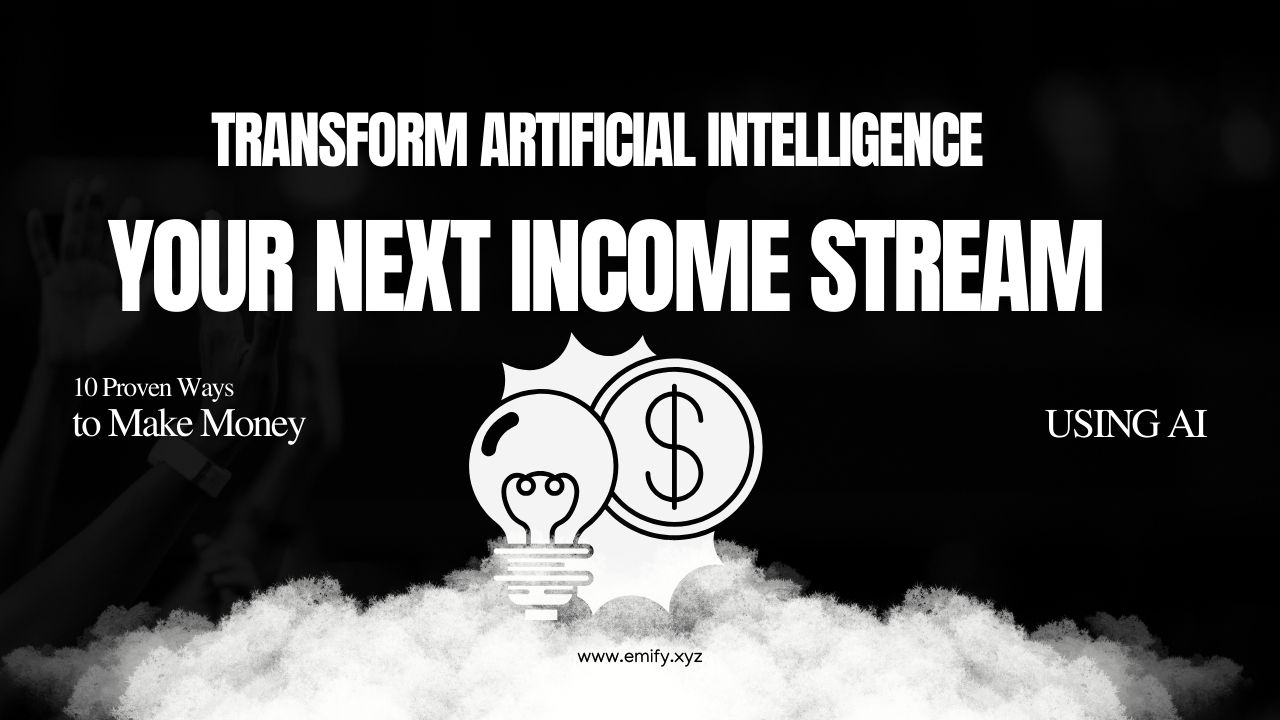Artificial intelligence isn’t just transforming industries—it’s creating entirely new opportunities for entrepreneurs, freelancers, and side hustlers to generate income. Whether you’re looking to replace your full-time salary or earn extra cash on weekends, AI tools have democratized access to capabilities once exclusive to large corporations with massive budgets.
The beauty of making money with AI lies in its accessibility. You don’t need a computer science degree or years of technical training to start leveraging these powerful tools. Many AI platforms are designed with user-friendly interfaces that allow anyone to harness sophisticated technology with just a few clicks.
In this comprehensive guide, we’ll explore ten legitimate and profitable ways to monetize artificial intelligence, from content creation and design services to more advanced applications like chatbot development and data analysis. Each method includes practical steps to get started, realistic income expectations, and tips for scaling your AI-powered business.
Why AI is the perfect tool for modern entrepreneurs
Before diving into specific money-making strategies, it’s worth understanding why AI represents such a compelling opportunity for income generation right now.
First, AI dramatically reduces the time and skill barriers that traditionally prevented people from entering certain markets. Tasks that once required specialized expertise—like graphic design, copywriting, or data analysis—can now be accomplished by anyone with access to the right AI tools and a willingness to learn.
Second, everyone wants AI services now. Businesses in every industry are trying to use AI, but most don’t know how to do it well. This creates a huge opportunity for people who can help them by offering AI services.
Third, AI tools often have low startup costs compared to traditional businesses. Instead of investing thousands in equipment or inventory, you can often get started with just a monthly subscription to an AI platform and your existing computer.
Finally, AI-based businesses are highly scalable. Once you’ve developed effective prompts, workflows, or systems, you can often replicate your results across multiple clients or projects with minimal additional effort.
1. Content creation and copywriting services
One of the most accessible ways to make money with AI is by offering content creation and copywriting services enhanced by artificial intelligence. AI writing tools like ChatGPT, Claude, Jasper, and Copy.ai have revolutionized the content creation process, allowing writers to produce high-quality material faster and more efficiently than ever before.
The key to success in AI-powered content creation isn’t just using the tools—it’s knowing how to use them strategically while adding your own expertise and human touch. Businesses need blog posts, social media content, email campaigns, product descriptions, and marketing copy, but they often lack the time or skills to create this content themselves.
To get started, focus on developing expertise in specific niches where you can combine AI efficiency with domain knowledge. For example, if you have experience in fitness, you could specialize in creating AI-enhanced content for gyms, personal trainers, and wellness brands. Your understanding of the industry allows you to guide the AI toward more accurate, relevant, and valuable content.
The process typically involves using AI to generate initial drafts, then editing, fact-checking, and refining the content to ensure it meets professional standards and aligns with the client’s brand voice. Many successful AI content creators develop detailed prompting strategies and editing workflows that allow them to consistently deliver high-quality results.
Pricing for AI-enhanced content services varies widely based on complexity and client budgets. Many freelancers charge between $50 to $200 per blog post, $25 to $100 per social media post, or $500 to $2,000 for comprehensive content packages. The key is positioning yourself as a strategic content partner rather than just someone who runs text through an AI tool.
To build this business, start by creating samples in your chosen niche, then reach out to potential clients through platforms like Upwork, Fiverr, or LinkedIn. As you build a portfolio and client base, you can gradually increase your rates and focus on higher-value, long-term client relationships.
2. AI-powered graphic design and visual content
Visual content creation represents another lucrative opportunity for AI monetization. Tools like Midjourney, DALL-E, Stable Diffusion, and Canva’s AI features have made it possible for non-designers to create professional-quality graphics, illustrations, and marketing materials.
The demand for visual content is enormous and constantly growing. Every business needs logos, social media graphics, website images, marketing materials, and promotional content. Traditional graphic design services can be expensive and time-consuming, creating an opportunity for AI-powered alternatives that deliver quality results more quickly and affordably.
Success in AI graphic design requires developing both technical skills with the tools and an eye for design principles. While AI can generate impressive visuals, knowing how to craft effective prompts, select the best outputs, and make strategic edits separates professional results from amateur attempts.
Many AI graphic designers specialize in specific types of content or industries. Some focus on social media graphics for small businesses, others create illustrations for children’s books, and still others develop marketing materials for e-commerce brands. Specialization allows you to develop expertise, streamline your processes, and command higher prices.
The workflow typically involves understanding client requirements, crafting detailed prompts to generate multiple options, selecting and refining the best results, and delivering final files in appropriate formats. Many successful AI designers also offer additional services like brand consultation or content strategy to increase project value.
Pricing strategies vary significantly based on the complexity and usage rights of the designs. Simple social media graphics might sell for $25 to $75 each, while custom illustrations or comprehensive branding packages can command $500 to $5,000 or more. Many designers offer package deals or retainer arrangements for ongoing work.
Building this business often starts with creating a strong portfolio showcasing your AI-generated work a cross different styles and applications. Platforms like Behance, Dribbble, and Instagram can help showcase your capabilities, while freelance marketplaces and direct outreach help secure initial clients.
3. Virtual assistant services enhanced by AI
The virtual assistant industry has been transformed by AI tools that can automate routine tasks, analyze data, and handle complex workflows. By combining traditional VA skills with AI capabilities, you can offer more valuable services while working more efficiently.
Modern AI-enhanced virtual assistants can handle tasks like email management, calendar scheduling, research, data entry, social media management, and customer service. The key advantage is that AI tools allow you to process larger volumes of work while maintaining high quality and consistency.
For example, you might use AI to draft email responses based on common inquiries, then review and personalize them before sending. Or you could employ AI tools to research potential leads, compile contact information, and even craft initial outreach messages. AI can also help with data analysis, report generation, and project management tasks that would traditionally require specialized skills.
The most successful AI-enhanced virtual assistants position themselves as strategic partners rather than just task executors. They use AI to handle routine work efficiently, freeing up time to focus on higher-value activities like strategy, relationship building, and business development support.
Specializing in specific industries or types of businesses can significantly increase your earning potential. For instance, you might focus on supporting real estate agents, e-commerce businesses, or professional service firms. Industry specialization allows you to develop expertise in relevant tools, understand common challenges, and create standardized processes that improve efficiency.
Pricing for AI-enhanced VA services typically ranges from $15 to $50 per hour, depending on the complexity of tasks and level of expertise required. Many VAs also offer project-based pricing or monthly retainer arrangements. The key is demonstrating the value you provide through improved efficiency, accuracy, and strategic insights.
To build this business, start by identifying your target market and the specific AI tools that can enhance your service delivery. Create case studies showing how you’ve used AI to improve outcomes for clients, and focus on building long-term relationships that allow you to understand each client’s business deeply.
4. Online course creation and educational content
The online education market continues to grow rapidly, and AI tools have made it easier than ever to create high-quality educational content. Whether you’re developing courses, tutorials, or training materials, AI can help with content creation, video editing, graphic design, and even personalized learning experiences.
AI-powered course creation typically involves using various tools throughout the development process. AI writing tools can help outline course structures, create lesson content, and develop assessments. AI video tools can assist with editing, adding captions, and creating engaging visual elements. AI design tools can produce course graphics, infographics, and promotional materials.
The key to success in AI-enhanced course creation is combining technological efficiency with genuine expertise and teaching ability. Students can tell the difference between content that’s been thoughtfully crafted by an expert and material that’s been generated purely by AI without human insight.
Many successful course creators use AI to handle time-consuming production tasks while focusing their human effort on curriculum design, student engagement, and continuous improvement based on feedback. This approach allows them to produce more content while maintaining quality and authenticity.
Popular course topics that work well with AI enhancement include digital marketing, business skills, creative techniques, and technology training. The key is choosing subjects where you have genuine expertise and can provide valuable insights beyond what students could get from AI tools alone.
Revenue potential varies widely based on course quality, marketing effectiveness, and pricing strategy. Successful course creators often earn anywhere from $1,000 to $50,000 or more per course, with some building six-figure businesses through multiple courses and ongoing student communities.
Platforms like Teachable, Thinkific, and Udemy make it relatively easy to publish and sell courses, while AI tools can help with everything from content creation to student support through chatbots and automated feedback systems.
5. AI chatbot development and automation services
As businesses increasingly seek to automate customer service and improve user experiences, there’s growing demand for AI chatbot development and automation services. This opportunity doesn’t require extensive programming knowledge, as many modern platforms offer no-code or low-code solutions for creating sophisticated chatbots.
AI chatbots can handle customer inquiries, qualify leads, schedule appointments, process orders, and provide 24/7 support. For businesses, this represents significant cost savings and improved customer satisfaction. For entrepreneurs, it represents an opportunity to provide valuable services with relatively low overhead.
The most successful chatbot developers focus on understanding business processes and customer journey mapping rather than just technical implementation. They work with clients to identify the most valuable automation opportunities and design chatbots that genuinely improve the customer experience.
Common applications include e-commerce customer support, appointment scheduling for service businesses, lead qualification for sales teams, and FAQ automation for various industries. Each application requires understanding the specific business context and designing appropriate conversation flows.
Modern chatbot platforms like Chatfuel, ManyChat, Dialogflow, and others provide user-friendly interfaces for creating sophisticated bots without extensive coding. The key skills involve understanding conversation design, integrating with existing business systems, and optimizing bot performance based on user interactions.
Pricing for chatbot development services typically ranges from $500 to $5,000 for initial setup, plus ongoing maintenance fees of $100 to $500 per month. More complex enterprise solutions can command significantly higher prices. Many developers also offer training and support services to help businesses maximize their chatbot investments.
Building this business often starts with creating demo bots for different industries, then reaching out to potential clients to demonstrate the value proposition. Success requires both technical skills and business acumen to identify the most impactful automation opportunities.
6. Data analysis and business intelligence services
AI has democratized data analysis, making it possible for non-experts to provide valuable business intelligence services. Tools like ChatGPT’s data analysis features, Google’s AI-powered analytics, and specialized platforms can help process large datasets and generate actionable insights.
Many small and medium-sized businesses have access to valuable data but lack the expertise to analyze it effectively. They collect information from sales systems, website analytics, customer surveys, and social media but struggle to turn this data into strategic insights.
AI-powered data analysis services can help businesses understand customer behavior, identify trends, optimize marketing campaigns, improve operational efficiency, and make better strategic decisions. The key is combining AI analytical capabilities with business acumen to provide recommendations that actually drive results.
Successful data analysts using AI tools focus on asking the right questions and interpreting results in business context rather than just running data through algorithms. They help clients understand what the data means for their specific situation and what actions they should take based on the insights.
Common services include customer segmentation analysis, sales performance reporting, marketing campaign optimization, operational efficiency studies, and competitive analysis. Each requires understanding both the technical capabilities of AI tools and the business implications of the findings.
The workflow typically involves data collection and cleaning, analysis using AI tools, interpretation of results, and presentation of findings with actionable recommendations. Many analysts also provide ongoing monitoring and reporting services to track progress over time.
Pricing varies based on project complexity and client size, ranging from $1,000 to $10,000 or more for comprehensive analysis projects. Many analysts also offer monthly retainer arrangements for ongoing reporting and monitoring services.
Building credibility in this field requires demonstrating your ability to generate valuable insights and recommendations. Creating case studies and sample analyses can help showcase your capabilities to potential clients.
7. AI-powered social media management
Social media management has been revolutionized by AI tools that can help with content creation, scheduling, audience analysis, and performance optimization. This creates opportunities for entrepreneurs to offer comprehensive social media services enhanced by artificial intelligence.
AI can assist with various aspects of social media management, including content ideation, post creation, hashtag research, optimal posting times, audience engagement, and performance analysis. The key is using these tools strategically while maintaining authentic brand voice and genuine community engagement.
Many successful AI-powered social media managers specialize in specific industries or platforms where they can develop deep expertise. For example, some focus on Instagram marketing for fashion brands, while others specialize in LinkedIn content for B2B companies. Specialization allows for more targeted service offerings and higher pricing.
The typical workflow involves using AI tools to generate content ideas and initial drafts, then editing and customizing content to match each client’s brand voice and audience preferences. AI analytics tools help track performance and optimize strategies over time.
Services often include content creation, posting schedules, community management, influencer outreach, and performance reporting. Many social media managers also offer strategy consulting and training services to help clients understand and leverage social media more effectively.
Pricing structures vary widely, from $500 to $3,000 per month for comprehensive management services, depending on the number of platforms, posting frequency, and level of engagement required. Project-based work like content creation or strategy development might range from $200 to $2,000 per project.
Success in this field requires staying current with platform changes, understanding audience behavior, and maintaining authentic engagement while leveraging AI efficiency. Building a portfolio of successful client results is crucial for attracting new business.
8. Custom AI tool development and consulting
As AI adoption accelerates across industries, there’s growing demand for consultants who can help businesses identify opportunities, select appropriate tools, and implement AI solutions effectively. This doesn’t necessarily require deep technical expertise, but rather the ability to understand business needs and match them with available AI capabilities.
AI consulting services might include technology assessment, implementation planning, staff training, process optimization, and ongoing support. Many consultants specialize in specific industries or types of AI applications where they can develop deep expertise.
The most valuable AI consultants focus on business outcomes rather than just technology implementation. They help clients understand how AI can solve specific problems, improve efficiency, or create new opportunities. This requires combining technical knowledge with business acumen and change management skills.
Common consulting engagements include AI readiness assessments, tool selection and implementation, staff training programs, process automation projects, and ongoing optimization services. Each requires understanding both the technical capabilities of AI tools and the practical challenges of business implementation.
Many AI consultants also develop custom solutions using no-code or low-code platforms, creating specialized tools for specific client needs. This might involve building custom chatbots, automated workflows, or data analysis dashboards.
Consulting rates typically range from $100 to $500 per hour, depending on expertise level and project complexity. Many consultants also offer project-based pricing or retainer arrangements for ongoing support. Enterprise consulting engagements can command significantly higher rates.
Building credibility in AI consulting requires demonstrating successful implementations and staying current with rapidly evolving technology. Creating case studies, publishing thought leadership content, and obtaining relevant certifications can help establish expertise.
9. AI-enhanced e-commerce and dropshipping
E-commerce and dropshipping businesses can be significantly enhanced by AI tools that help with product research, listing optimization, customer service, marketing, and operations management. AI can help identify profitable products, create compelling listings, and automate many routine tasks.
AI tools can assist with market research by analyzing trends, competition, and customer demand across different platforms and niches. They can help optimize product listings with compelling descriptions, relevant keywords, and attractive images. Customer service can be enhanced with AI chatbots that handle common inquiries and support requests.
Marketing efforts can be improved through AI-powered ad creation, audience targeting, and performance optimization. Inventory management and pricing strategies can also benefit from AI analysis of market conditions and competitor behavior.
The key to success is using AI to improve efficiency and decision-making while maintaining focus on customer satisfaction and business fundamentals. AI tools should enhance rather than replace good business practices and customer service.
Many successful AI-enhanced e-commerce entrepreneurs focus on specific niches where they can develop expertise and build brand recognition. This allows for more targeted marketing and better customer relationships than trying to compete in oversaturated general markets.
Revenue potential varies enormously based on product selection, marketing effectiveness, and operational efficiency. Some entrepreneurs build modest side incomes of a few hundred dollars per month, while others develop six-figure businesses. The key is starting small, learning from results, and scaling successful strategies.
Success requires understanding both e-commerce fundamentals and how to leverage AI tools effectively. This includes product research, supplier relationships, customer service, marketing, and financial management enhanced by artificial intelligence.
10. AI-powered content monetization and affiliate marketing
Content creation combined with affiliate marketing represents a scalable way to monetize AI capabilities. By using AI tools to create valuable content across various platforms, you can build audiences and promote relevant products or services through affiliate partnerships.
AI can help with content ideation, creation, optimization, and distribution across blogs, social media, YouTube, podcasts, and other platforms. The key is creating genuinely valuable content that serves audience needs while naturally incorporating affiliate promotions.
Successful AI-powered affiliate marketers often focus on specific niches where they can build authority and trust with their audience. This might involve creating educational content about AI tools themselves, or using AI to create content in other profitable niches like health, finance, or technology.
The typical approach involves using AI to research topics, create initial content drafts, optimize for search engines, and distribute across multiple channels. Human oversight ensures content quality, authenticity, and strategic alignment with monetization goals.
Revenue streams can include affiliate commissions, sponsored content, digital product sales, and advertising revenue. Many content creators diversify across multiple income sources to reduce risk and maximize earning potential.
Building a successful affiliate marketing business with AI requires patience and consistency. It often takes months to build significant traffic and audience engagement, but the long-term potential can be substantial. Some successful affiliate marketers earn thousands or even tens of thousands of dollars per month.
The key is providing genuine value to your audience while strategically promoting products that align with their needs and interests. AI tools can help with efficiency and scale, but success ultimately depends on building trust and delivering value consistently over time.
Getting started with AI monetization
Regardless of which AI monetization strategy appeals to you most, there are several key principles that apply to building any successful AI-powered business.
First, start with a clear understanding of the problem you’re solving and the value you’re providing. AI tools are powerful, but they’re most effective when applied to genuine business needs or customer pain points. Focus on outcomes rather than just the technology itself.
Second, invest time in learning your chosen AI tools thoroughly. While many AI platforms are user-friendly, mastering their capabilities and limitations takes practice. Develop systematic approaches and workflows that allow you to deliver consistent, high-quality results.
Third, maintain focus on quality and authenticity. AI can help you work more efficiently, but it shouldn’t replace human judgment, creativity, or genuine expertise. The most successful AI entrepreneurs use technology to enhance their capabilities rather than replace their unique value proposition.
Fourth, start small and scale gradually. Most successful AI businesses begin as side projects or small experiments that grow over time. This allows you to learn, refine your approach, and build credibility before making larger commitments.
Finally, stay current with AI developments and industry trends. The AI landscape evolves rapidly, with new tools and capabilities emerging regularly. Successful AI entrepreneurs maintain curiosity and adaptability, continuously learning and adjusting their strategies.
Conclusion
Artificial intelligence has created unprecedented opportunities for individuals to build profitable businesses and generate income streams that were previously impossible or required significant capital investment. From content creation and design services to consulting and automation, AI tools have democratized access to capabilities that can solve real business problems and create genuine value.
The key to success isn’t just using AI tools, but using them strategically to enhance your unique skills and expertise. The most profitable AI-powered businesses combine technological efficiency with human insight, creativity, and business acumen. They focus on solving real problems and delivering measurable value to clients and customers.
Whether you’re looking to replace your full-time income or just earn some extra money on the side, AI offers scalable opportunities that can grow with your ambitions and expertise. The businesses and income streams outlined in this guide represent just the beginning of what’s possible as AI technology continues to evolve and mature.
The best time to start exploring AI monetization opportunities is now, while the technology is still relatively new and competition is manageable. By developing expertise with AI tools and building a track record of successful implementations, you’ll be well-positioned to capitalize on the continued growth and adoption of artificial intelligence across industries.
Start with one approach that aligns with your existing skills and interests, focus on delivering exceptional value, and gradually expand your capabilities and service offerings as you gain experience and confidence. With persistence, creativity, and strategic thinking, AI can become a powerful engine for building the income and lifestyle you desire.



